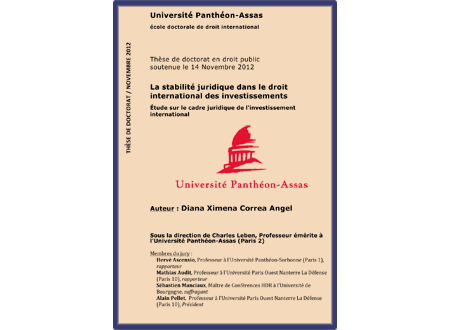The Legal Stability in International Investment Law, PhD Thesis

Supervisor Professor Charles Leben, University of Paris II Panthéon-Assas
Available in French at Cujas Library and the IHEI Library, Paris
Discussions of legal stability involve the notions of change and permanence; therefore, legal stability cannot oppose legal change. If nothing changed, there would be no need to talk of stability, and one would simply speak of intangibility, immutability or even of the eternity of the law. Through stability we seek to ensure two important legal values: the development of law and the principle of legal security. Stability is a central aspiration of every law. In the field of objective law, stability is protected in order to prevent a surfeit of laws, disorder in the legislative process and to facilitate the application of laws over time. In the field of subjective rights, it often exists in order to maintain certain specific legal situations and rights in spite of the passage of time. These aspects are reflected in international investment law through the legitimate expectation of legal stability. This being the case, so that such an expectation of legal stability be considered legitimate, there must be an explicit or implicit commitment by the State in this direction and investors must act diligently and in good faith. On the substantive side, it is also necessary that the investor does not expect the law not to change given that law evolves with time. Nevertheless, the investor can legitimately expect that regulatory changes be introduced in a predictable and non-arbitrary manner. Violation of legal stability by the State incurs international liability. Beyond these considerations, today legal stability faces a lot of challenges; the most important of which seems to be its emergence as a customary principle of international law.
